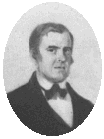Thomas B. Marsh
Thomas Baldwin Marsh, the first President of the Quorum of the Twelve Apostles, left the Church because of a case of “milk strippings” and unfair war. Why, would one so high in trust and calling by the Lord, betray that trust and go into separate ways?
Marsh was born on November 1, 1799 in the town of Acton, Middlesex Co., Massachusetts to James and Mary Law Marsh. At the age of fourteen he “ran away” from home and placed himself in several Vermont and New York areas. After marrying Elizabeth Godkin, Marsh opened a grocery store in New York City. While all of these events were occurring, he strived to become an ardent Methodist, but ultimately could not find parallelism between that faith and the Bible.
“The Spirit of God” directed Thomas B. Marsh to go westward, for a reason he did not know at that time. When going westward he soon heard the story of a “youth” who had discovered a “golden Bible” in Palmyra, and that the best contact for information about the “golden Bible” would be Martin Harris. Marsh immediately traveled to Grandin’s Printing Shop, where he met Harris, who was one of the Three Witnesses, and read the first sixteen pages of the Book of Mormon off of the fresh printing press. Harris directed the young man to the home of Joseph Smith Sr., where Joseph Smith Jr. and Oliver Cowdery resided for the time being.
In September of 1830, Marsh and his family moved to Palmyra and were baptized by David Whitmer, one of the Three Witnesses. A few days after his baptism, Marsh was ordained an elder and by revelation called as “a physician” to the new church. After moving with his family to Kirtland, Ohio, Marsh was ordained a high priest, putting him in a high leadership position. After leading a company of families to Missouri, he was chosen as a member of the Missouri high council.
In April of 1835, he was called as a member of the newly reorganized Quorum of the Twelve Apostles. As Marsh was the oldest apostle (with a known date of birth), he was also the most senior apostle, making him the President of the Quorum of the Twelve Apostles. In this calling, he traveled around the Eastern United States, organizing branches and holding area conferences. During this time, he was able to learn basic English grammar from Sidney Rigdon and Hebrew from Professor Seixas.
However, apostasy soon clouded the once happy city of Kirtland. Several members of the Quorum of the Twelve had turned against “Brother Joseph” and were now actively pushing for another church government. In response to this, Marsh traveled to Kirtland, with fellow apostles Elders David W. Patten and William Smith, to “reconcile some of the Twelve” and help restore proper organization within the higher levels of the church in Ohio. While there, he served as a mediator between the loyal members of the church and the apostate members and created a reconciliation between the two parties.
Marsh later moved with the church back to Far West, Missouri, and there removed Elders Luke Johnson, Lyman E. Johnson, and John F. Boynton from the Quorum of the Twelve for charges of apostasy.
However, his own apostasy was about to blow heavily on the church. According to George A. Smith, a future member of the First Presidency and Quorum of the Twelve, Mrs. Elizabeth Marsh had a serious quarrel with Mrs. Lucy Harris, wife of Martin Harris. Mrs. Harris accused Mrs. Marsh of keeping the milk strippings, or richest part of the milk, when they decided to trade milk. Mrs. Marsh supposedly kept the strippings and gave Mrs. Harris the rest of her milk, while Mrs. Harris gave Mrs. Marsh all of her milk, including the strippings.
This case was first brought before the Teachers’ quorum, who upheld Mrs. Harris’ claims. By this time, Thomas Marsh was becoming angry at the claims brought against his wife, as he was the President of the second-highest quorum in the church. So, he brought the claims before the Bishop, who upheld the teachers’ decision. Then, he brought the claims to the high council, who again sided with the bishop and the teachers. Finally, Marsh brought a repeal before the First Presidency of the Church, which, like the other quorums before it, approved of the claims by Mrs. Harris.
The second and last part of Marsh’s apostasy was his view on the “Mormon War” in Missouri. When local mobsters threatened and attacked local members of the church, the more volatile members retaliated and started to threaten and attack neighboring counties. This caused Marsh to sign an affidavit with Orson Hyde and W.W. Phelps, stating that President Smith was in open rebellion against the state of Missouri. The signed affidavit was the only piece of evidence needed to drive the church, and its 15,000 members, out of the state of Missouri.
For several years, Marsh stayed away from the church, still bitter in his feelings towards his once-fellow Brethren. However, after his wife’s death, Marsh once again sought to reunite with the church he once helped lead. In 1857, Marsh journeyed to Salt Lake City, Utah, where he was rebaptized as a member of the church. Afterwards, he was ordained an elder, and later a high priest in 1861. He later remarried, and died in the faith in January of 1866 in Ogden, Utah.






